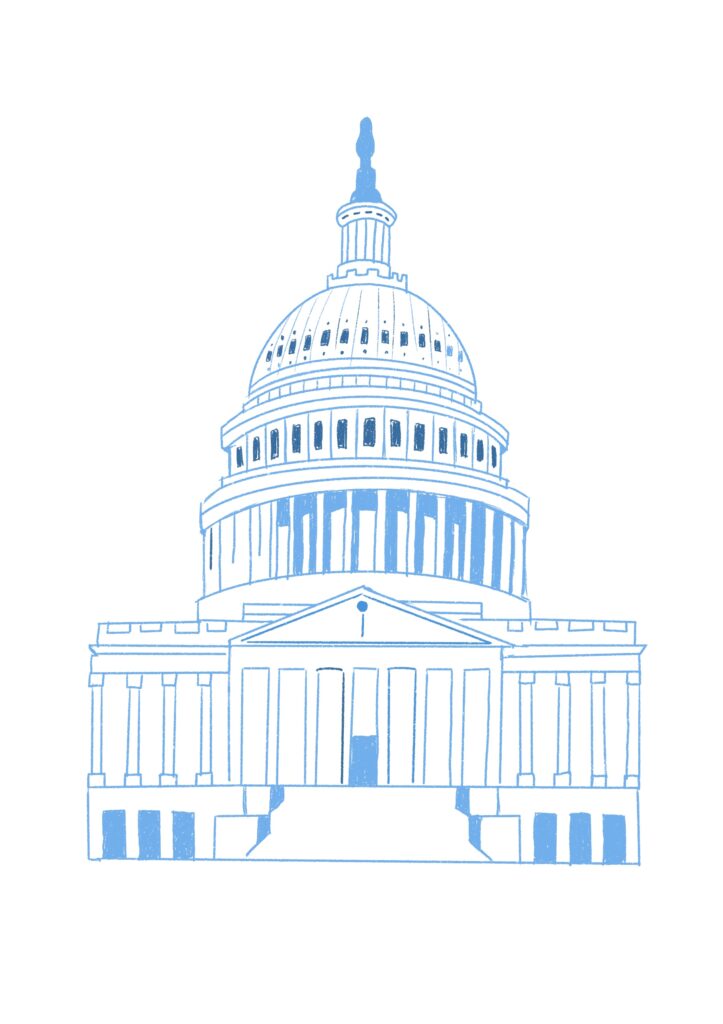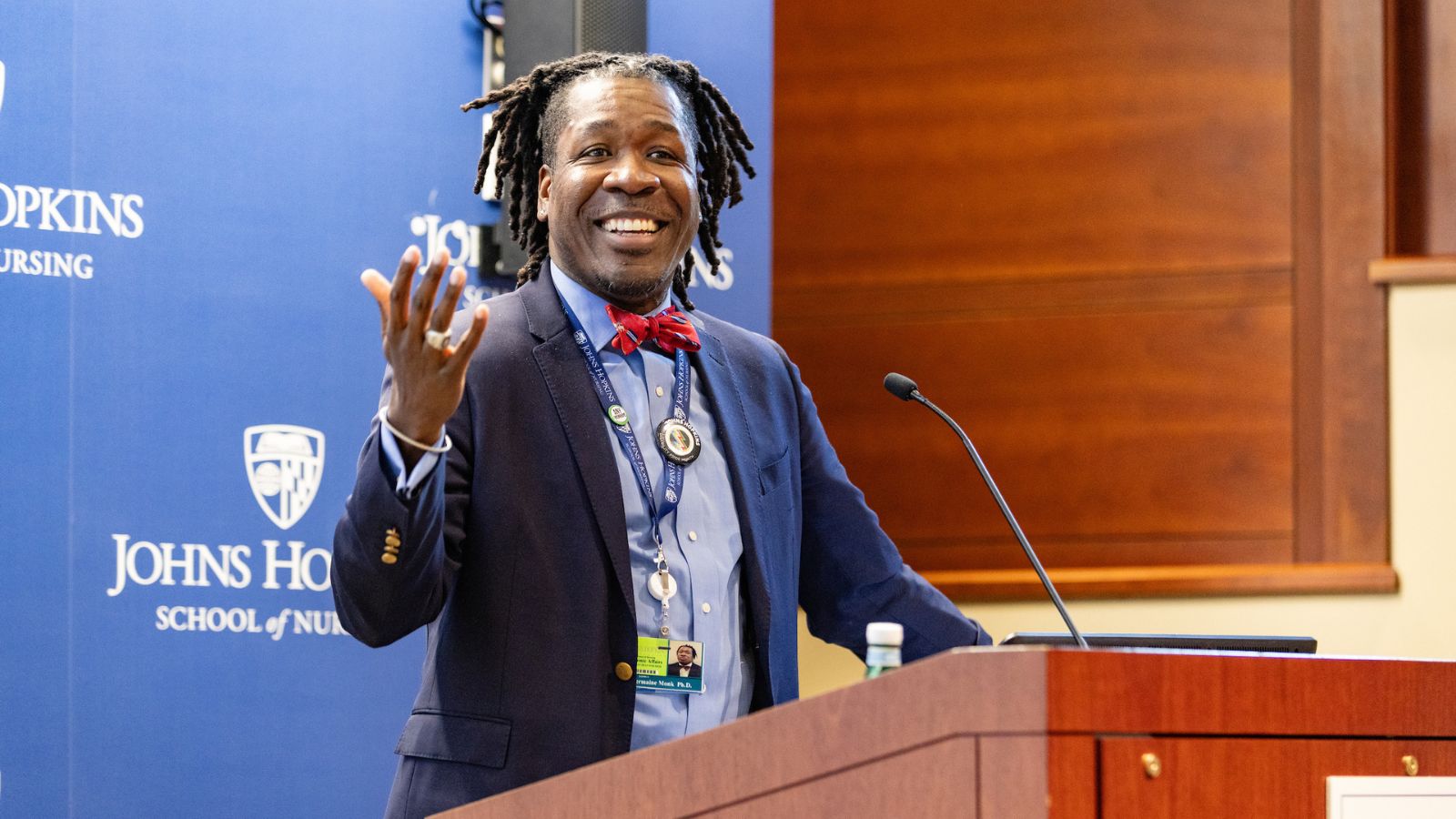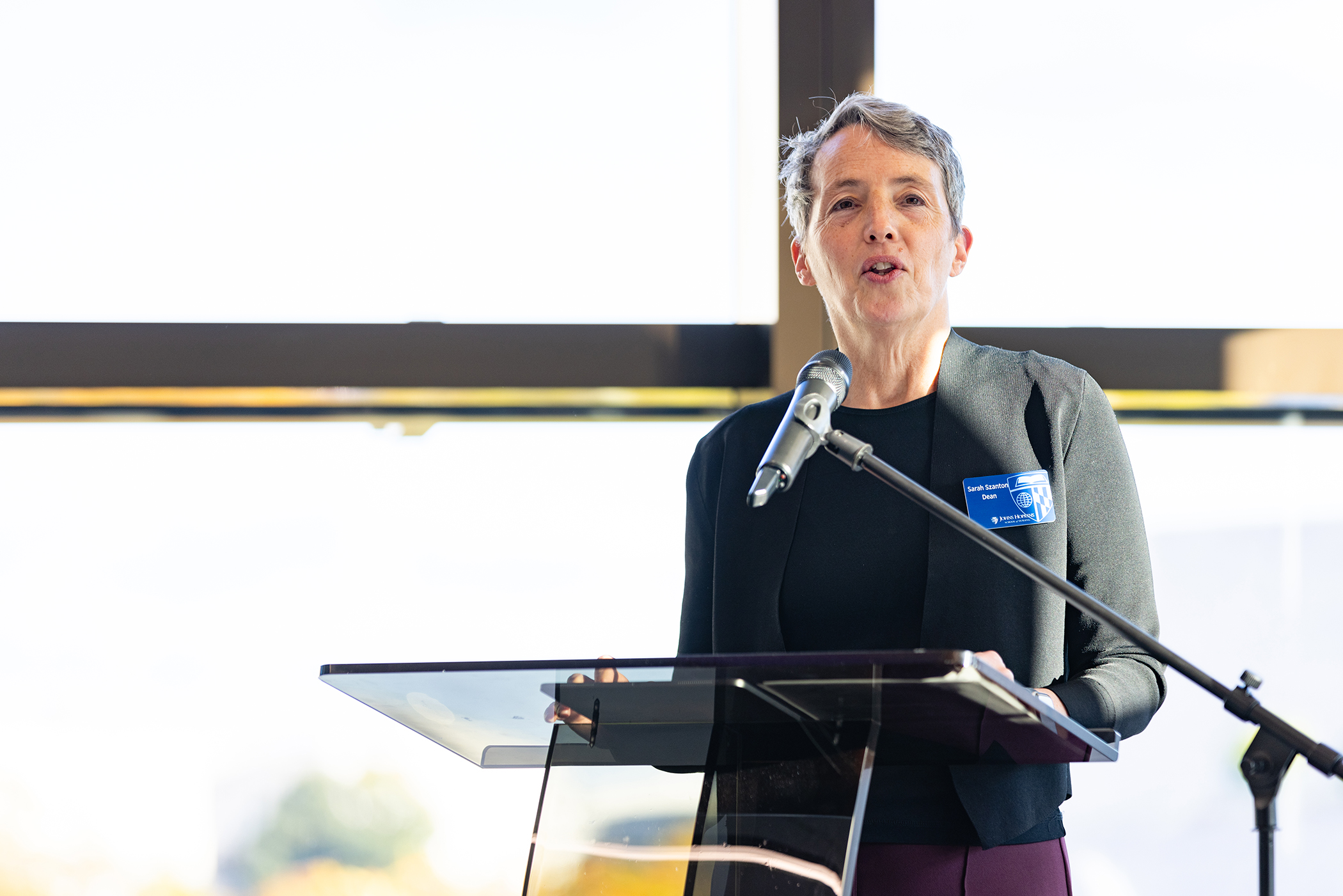JHSON jumps at the opportunity to build and share its skills.
For so long, policy has been a carrot at the end of a stick. If nursing could just run faster, jump higher, build more leaders with the gumption to overcome hurdles—economic, cultural, pandemic-related—to reach the influencers’ table, it would at last show the world that health care for all is not an impossible dream.
It must be true that carrots sharpen the vision.
For the Johns Hopkins School of Nursing has its sights set on shifting the dialogue on the profession, saluting all who have come before and all the amazing advances they’ve made, of course, and then using it all as a fulcrum on policy. It starts, as does everything at the Johns Hopkins School of Nursing (JHSON), with the students.
“One of the important things, in the policy arena, is making sure that nurses have a voice,” explains Professor Jacquelyn Campbell, PhD, MSN, RN, FAAN, a mentor for the brand-new Policy Honors Program whose own legendary advocacy on preventing violence against women has changed laws and saved lives. “A Policy Honors Program is a place where [students] can learn about that, how that looks, how to do it, how to be mentored in both creating policy and implementing it.”
“The possibilities for nurses in terms of impact and health policy and the world we live in are immense,” adds Dean Sarah Szanton, PhD, RN, FAAN. “If nurses were more involved in policy and advocacy, there would be more access to care, there would be more understanding of people’s structural and social determinants of health and how to change them while seeing people and families as communities. More of health care would happen in the schools and where people are.”
This year, the school welcomed its inaugural cohort of Policy Honors Scholars: Master’s (Entry into Nursing) students—clockwise from top left in image—Christian Jenkins, Kedrine Gayle, Melissa Noronha, Meredith Britton, Kiana Tolentino, Margaret Gebauer, Maureen Gates, Shane Curran-Hays, Kathryn Hodges, Olivia Walsh, and Tanya Miller.
The program is for students striving to gain experience and foundational skills in policy analysis and advocacy to address critical health challenges. The two-semester program aims to broaden students’ understanding of nursing’s role in policy and expand their skills and confidence to connect with policymakers, effectively communicate policy proposals, and advocate for better health for communities.

“This program offers the opportunity to connect with policymakers and to gain an understanding of how to navigate difficult health care questions,” explains Miller. “I came to the Johns Hopkins School of Nursing because I knew that here I would have the chance to gain experiences that no other program could offer. It is one of those once-in-a-lifetime opportunities.”
“We hope that nurses can start their careers with a sense of how crucial their knowledge is to changing policy and how important policy tools are for changing health,” says Szanton, who is teaching the inaugural 2023 curriculum, which includes discussion-based seminars, regular faculty mentoring sessions, and a policy-relevant project and final presentation. Discussion and assignments help students identify, evaluate, and influence local, state, federal, and global policy issues. “As more nurses are involved in policy and advocacy, more people will have access to care and better outcomes in life.”
“Advocacy is an inherent part of nursing,” adds Jenkins, “and this program does a great job of integrating us into the world of policymaking. It’s a unique opportunity to learn from leading experts, from community-based researchers to congressional lobbyists.”
“As more nurses are involved in policy and advocacy, more people will have access to care and better outcomes in life.”
Policy Honors Scholars are paired with faculty mentors like Campbell after an interview and matching process. (Mentors will rotate to offer access to the breadth of expertise among JHSON faculty.) The seminar course must be taken both semesters that each student participates in the program. Discussions and varied writing and presentation exercises assignments will advance students’ ability to effectively communicate their analyses and policy proposals. In their second semester, students produce a policy-relevant project.
Their successes will be celebrated in part through the annual Dean’s Award for Outstanding Policy Influencer, honoring alumni whose advocacy accomplishments at the local, regional, national, or international level have made a significant impact in their field or whose policy and advocacy work has improved the health of individuals, communities, or populations and demonstrates how nurse leaders are providing outstanding contributions to health policy issues.
Learn more at nursing.jhu.edu/policyhonors.
The Institute
The Policy Honors Program is just one part of a strengthened policy focus.
A JHSON policy institute, so new it has not yet been officially named, is being built to maximize the expertise of nursing beyond the traditional role of caregiver, utilizing skills in nursing roles as researchers, data analysts, entrepreneurs, health care advocates and—most importantly—problem solvers. With a nursing lens, the institute will be interdisciplinary, cross-university, and forward-leaning, with cutting-edge and collaborative research focused on two main pillars of work, Szanton explains:
“Changing how nurses see themselves.” To achieve better health for the United States and the world through greater nursing leadership, the Institute will create a policy pathway for implementation of nursing interventions developed at the School of Nursing. These interventions will involve new and existing models of prevention and care (including training initiatives to increase diversity of the field) new payment models, tech-enabled and virtual nursing care, and other enquiries with the potential to change nursing from an undervalued necessary cost to a fully valued asset.
“Changing how the rest of the world thinks of nurses.” To elevate the policy, communications, and media culture around nursing, the Institute will serve as a resource center where policymakers and news outlets can routinely seek nurses’ input, the Institute will highlight nurses as problem solvers and policy experts. The trust the public maintains in nurses – at a time of diminishing trust in other experts in scientific and health experts – will be an asset. These efforts will include hosting journalists-in-residence, White House fellow alumni, as well as training for nurses on strategic communications.
The JHSON policy institute arrives at a pivotal moment in the national project around the future of nursing. The National Academy of Medicine and Robert Wood Johnson Foundation’s sweeping report The Future of Nursing 2020-2030: Charting a Path to Achieve Health Equity explored the important contributions of nursing to addressing social determinants of health and health equity in the U.S. The report found numerous knowledge gaps relating to what interventions might work in future global pandemics and other disasters, how to advance health equity, address social determinants of health, and meet the social needs of individuals and families.
555 Pennsylvania Avenue

Talk about perfect timing. “555 Penn” in Washington, DC was purchased by Johns Hopkins University in 2020 as a future hub for learning and to bring more of JHU’s research and expertise to national and global policy-making debates. It is within walking distance of the U.S. Capitol and three Metro stations as well as Amtrak and MARC trains at Union Station.
The building was previously home to the Newseum and, after extensive renovations, will be ready this fall to house the JHU School of Advanced International Studies as well as programs from all academic divisions of the university, including the JHSON. The presence at 555 Penn will allow for greater collaboration and flow of ideas and people between Baltimore and Washington.
“The renovated building will provide opportunities for every academic division of the university to pursue research and educational activities in Washington—complementing and drawing on those conducted on our flagship Baltimore campuses and deepening our connections to debates over national and global policy,” says JHU President Ronald Daniels. “Our commitment to contributing our ideas and expertise to these debates lies at the core of what it means to be a vital and relevant university.”
In addition, a recently unveiled, university wide initiative, the Johns Hopkins Nexus Awards, will be a $15 million fund for faculty-led proposals for research, courses, and convenings at 555 Penn.
Time to Speak Up
The future of nursing is right now, insists Szanton, who on February 16 testified before a U.S. Senate Committee on nursing workforce shortages, clearly laying out the challenges. “I urge the committee to support the Future Advancement of Academic Nursing Act, or FAAN Act when it’s reintroduced [sponsors included JHSON alumnus Lauren Underwood, a congresswoman from Illinois]. It would address all of the areas that I’ve mentioned, solving barriers for students, preceptors, faculty, and enhancing infrastructure. … Today, nurse scientists are developing many models that may soon provide health care for our nation that is both better and less expensive,” she told the panel led by Senator Bernie Sanders of Vermont.
And the rules of engagement with governments, communities, and—most important—patients are being written right now. Szanton and fellow leaders at the Johns Hopkins School of Nursing are determined to make sure that nurses are holding their share of the pens.
“I think that if we as nurses, the nation’s most trusted health profession, don’t raise not only a clinical voice but a scientific voice, in support of people and their autonomy of decision making, we will certainly continue to see such legislative efforts that are based in misguided beliefs,” insists Professor Jason Farley, PhD, MPH, FAAN, a Policy Scholars Program mentor a trusted voice of reason and leadership through the COVID-19 pandemic.
Assistant Professor Janiece Taylor, PhD, MSN, RN, FAAN, recently sat on a panel for the Congressional Black Caucus on “Black Pain Matters” to discuss disparities in pain management among African Americans across the lifespan.
“When I think about policy, I think of it as being the roots under the ground,” Taylor explains. “And having those strong roots can be a good thing or it can be a bad thing, depending upon what’s growing. … Our investment in policy is an investment in those roots. It may start off as a seed and take a long time to grow, but just knowing that we can establish these roots to transform health care is so powerful to me.”
“Today, nurse scientists are developing many models that may soon provide health care for our nation that is both better and less expensive.”
Meet the Mentors
Faculty mentors and areas of policy study for the 2023 Spring and Fall semesters:
Teresa Brockie, PhD, MSN, RN, FAAN—Indigenous Health
“My work focuses on achieving health equity through community-based intervention and prevention of suicide, trauma, and adverse childhood experiences using cultural strengths among tribal nations. … If we are to have an impact at a higher level for our patients, their families and communities, we have to be involved in policy.”
Jacquelyn Campbell, PhD, MSN, RN, FAAN—Domestic and Intimate Partner Violence
“One of the important things, in the policy arena, is making sure that nurses have a voice. A Policy Honors Program is a place where [students] can learn about that, how that looks, how to do it, how to be mentored in both creating policy and implementing it.”
Jason Farley, PhD, MPH, FAAN—Infectious Diseases
“I love taking students into the field, showing them the impact of a decision, a law, a policy, a rule, whether it’s something as basic as health care access and whether someone’s insurance is accepted at one location, and helping them think, ‘OK, how could you possibly change that?’ Those moments are the light bulb moments for those students … and that’s a thrill to me.”
Nancy Reynolds, PhD, MS, RN, FAAN—Global Health
“Historically, nurses have not been involved in helping to drive the directions of policy. And yet it’s so important to the work they do. With policy, you have the potential to maybe be affecting hundreds and thousands of lives.”
Hear mentors talk more about the Policy Honors Program’s potential impact at nursing.jhu.edu/policyhonors.

 Forging Policy: How Can Doulas Improve Black Maternal Health?
Forging Policy: How Can Doulas Improve Black Maternal Health? Forging Policy: Associate Dean Jermaine Monk and Education After Affirmative Action
Forging Policy: Associate Dean Jermaine Monk and Education After Affirmative Action Most People Want to Breastfeed, But Need More Support To Do So
Most People Want to Breastfeed, But Need More Support To Do So Awards for Diversity
Awards for Diversity From the Dean: Here & Now
From the Dean: Here & Now






